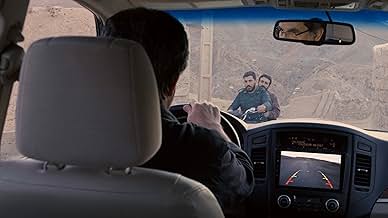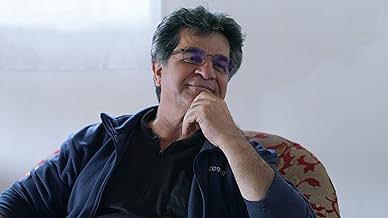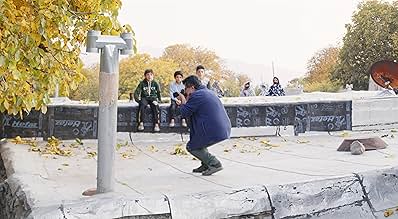PUNTUACIÓN EN IMDb
7,2/10
4,7 mil
TU PUNTUACIÓN
Sigue paralelamente dos historias de amor, donde sus deseos se ven truncados por obstáculos ocultos e inevitables, superstición y mecánica del poder.Sigue paralelamente dos historias de amor, donde sus deseos se ven truncados por obstáculos ocultos e inevitables, superstición y mecánica del poder.Sigue paralelamente dos historias de amor, donde sus deseos se ven truncados por obstáculos ocultos e inevitables, superstición y mecánica del poder.
- Premios
- 4 premios y 8 nominaciones en total
Bakhtiyar Panjeei
- Bakhtiar
- (as Bakhtiar Panjei)
Narges Delaram
- Ghanbar's mother (Madar_e Ghanbar)
- (as Narjes Delaram)
Reza Heidari
- Reza
- (as Reza Heydari)
Aliye Tuzun
- Police
- (as Aliye Tüzün)
Reseñas destacadas
Film director Jafar Panahi is prohibited from leaving Iran, but is trying to make a film in neighbouring Turkey. In order to make that work, he moves to a remote village near the border, where the communications are a bit hit and miss. With the help of his obliging host "Ghanbar" (Vahid Mobaseri), though, he tries to make the best of it. Initially, it's a friendly village but when he takes (or doesn't!) a photograph of a young couple, he finds himself drawn into an increasingly acrid stand-off between two young men, and their families, to whom a girl may have been betrothed when her umbilical cord was cut. His frustrations with these encroachments are not helped by production difficulties with the two two stars of his documentary-style film - real life lovers who are trying to find a way to escape, safely, to Paris. There is the slightest hint of menace here as the plot develops and although we see little actual evidence, there is a distinct sense that this man is increasingly unwelcome, despite the platitudes from the villagers, encouraging a sixth-sense feeling that the authorities are distantly watching this film-maker. There is a distinct perception of intimidation! What is also clear is that these ordinary Iranian people live in fear of the police, the Revolutionary guard and that rather flies in the face of their genuine, peaceable and hospitable, nature. Now, perhaps Panahi's less-is-more style works for some, but for me I found this all rather a slow watch. He shuffles around with little useful dialogue to develop his on-screen persona, nor my interest in him. Clearly this is a story about freedom and a sort of subliminal oppression but somehow the characters themselves here didn't really develop that theme sufficiently, nor did they really engage me. The ending, too, is disappointing and inconclusive in equal measure and I was rather underwhelmed. The film does offer us an interesting depiction of rural life that probably hasn't changed in millennia, but somehow I felt little better than a fly on the wall with nowhere near enough to go on to join in. Perhaps just too much of this is predicated on a knowledge by the audience of this director and of his relationship with his government.
A most excellent movie ! Thoroughly enjoyed it. For sure there were many layers and implicit meanings I missed but that is also what made this film so intriguing. The contrast between the mountain town in Iran and the city in Turkey, all the details, the character extras that clearly showed the cultural differences, I loved that. The border, the trafficking that was implied, the faithfulness to truth of the central actor who is also the director. It's also a movie that celebrates movie making, how storytelling prevails in film, the impact of a story upon the storyteller. It´s a very poignant movie.
Wonderful footage in a documentary style, great story, amazing insight into life on the frontier.
Well worth seeing.
Wonderful footage in a documentary style, great story, amazing insight into life on the frontier.
Well worth seeing.
The way Jafar Panahi successfully transcends and exceeds all the limits in his filmmaking always leaves me mind-boggled and is fascinatingly masterful. This viewing experience left me with a question "To what extent are you willing to go to tell your story?"
No Bears takes us through a powerful journey of sophisticated simplicity that expands boundaries and defies censorship restrictions both mentally and physically and in a blend of fiction and realism with a story of adaptive determination in creating, fear of crucial decisions, and passion for the story.
His ability to shape the narrative with all these elements is beyond impressive as Panahi sheds his lens on a parallel story between reality and fiction under the premise of hope, while metaphorically introducing a bigger political theme of the fear of modern authority versus the absurdity of the superstition that remains a common element in both narratives including the self-reflexively portrayal of himself as a character, which also introduces an intimate layer.
The storytelling crafts beautifully palpable emotions some of which are felt indirectly, where the sense of fear and threat are always visible and kept translating different feelings so well through an observative lens.
No Bears takes us through a powerful journey of sophisticated simplicity that expands boundaries and defies censorship restrictions both mentally and physically and in a blend of fiction and realism with a story of adaptive determination in creating, fear of crucial decisions, and passion for the story.
His ability to shape the narrative with all these elements is beyond impressive as Panahi sheds his lens on a parallel story between reality and fiction under the premise of hope, while metaphorically introducing a bigger political theme of the fear of modern authority versus the absurdity of the superstition that remains a common element in both narratives including the self-reflexively portrayal of himself as a character, which also introduces an intimate layer.
The storytelling crafts beautifully palpable emotions some of which are felt indirectly, where the sense of fear and threat are always visible and kept translating different feelings so well through an observative lens.
A masterfully crafted film that showcases the incredible talent of Iranian director Jafar Panahi. Despite facing constant harassment and a six-year prison sentence on baseless charges, Panahi continues to push the boundaries of cinema with his deeply personal and thought-provoking work.
In "No Bears," Panahi plays a fictionalized version of himself as he directs a film remotely from the Iranian village of Joban, near Turkey. When his WiFi goes out, he becomes intrigued by a local ceremony and loans one of his cameras to a villager to document it. The film then follows two parallel tracks: the story of Bakhtiar and Zara, which serves as a reconstruction of a real-life event, and the recording of the ceremony, which opens up a can of worms in the village as it is used as evidence against a young woman accused of having premarital relations.
Throughout the film, Panahi deftly explores themes of truth-telling, social activism, and the blurred lines between reality and fiction. The acting is superb, with Bakhtiar and Zara's tumultuous relationship feeling both realistic and emotionally charged. The cinematography and direction are also top-notch, with the film's remote setting adding to its sense of isolation and tension.
Overall, "No Bears" is a powerful and thought-provoking film that showcases the resilience and determination of its director. It is a must-see for fans of Panahi's work and anyone interested in the intersection of art and politics.
In "No Bears," Panahi plays a fictionalized version of himself as he directs a film remotely from the Iranian village of Joban, near Turkey. When his WiFi goes out, he becomes intrigued by a local ceremony and loans one of his cameras to a villager to document it. The film then follows two parallel tracks: the story of Bakhtiar and Zara, which serves as a reconstruction of a real-life event, and the recording of the ceremony, which opens up a can of worms in the village as it is used as evidence against a young woman accused of having premarital relations.
Throughout the film, Panahi deftly explores themes of truth-telling, social activism, and the blurred lines between reality and fiction. The acting is superb, with Bakhtiar and Zara's tumultuous relationship feeling both realistic and emotionally charged. The cinematography and direction are also top-notch, with the film's remote setting adding to its sense of isolation and tension.
Overall, "No Bears" is a powerful and thought-provoking film that showcases the resilience and determination of its director. It is a must-see for fans of Panahi's work and anyone interested in the intersection of art and politics.
Director Jafar Panahi is midway in his imprisonment/house arrest in Iran, a victim of a relentless Islamic theocracy. That little matter hasn't kept him from making five films, sometimes using technology to direct remotely, for instance, his current "No Bears," in which he depicts himself directing a film within the film. Directing a Turkish town from a place near the Iranian border lends a romance to an otherwise mortally-dangerous enterprise.
His films show how he fights the restrictions of the regime on his art. All five in some way or another may reveal his oppression and lack of artistic autonomy. Panahi's films reflect his late mentor, Abbas Kiarostami, and his challenging tension between "narrative" and "documentary," when a camera seems to play between fiction and reality.
Because he hasn't been allowed to leave Iran for 10 years, his movies have a cachet usually relegated to an artistic outlaw: "This Is Not a Film," "Closed Curtain," "Taxi" and "3 Faces" are almost classics. New Yorker magazine says "No Bears" is one of the best dramas of the year, and they're right.
In No Bears, after a wild opening in which an exiled Iranian couple argue in the street about a corrupt passport and escape into Europe, we realize it's a scene from the movie he is remotely directing. Then we are thrown into a Romeo and Juliet mash up that leaves Panahi's director at the mercy of local forces, both official and citizenry, who lay tradition and family rumbling at his feet for a photo disc he allegedly has that would resolve a fight over an arranged marriage.
Panahi's director claims he has no such compromising photo of the couple, but he shows little respect for the local traditions inherent in the love affair. Underneath, of course, is his comment on cinema as a means of discerning truth in a culture of fake news. The scene of Panahi feverishly looking for cellphone reception smartly underscores the struggle to find truth.
At the least, No Bears is a profound statement about the power of filmmaking as it clashes with custom and reality. It is a masterful meta-fiction that tells a complicated cultural tale and the fraught participation of cinema. 80 for Brady it is not.
His films show how he fights the restrictions of the regime on his art. All five in some way or another may reveal his oppression and lack of artistic autonomy. Panahi's films reflect his late mentor, Abbas Kiarostami, and his challenging tension between "narrative" and "documentary," when a camera seems to play between fiction and reality.
Because he hasn't been allowed to leave Iran for 10 years, his movies have a cachet usually relegated to an artistic outlaw: "This Is Not a Film," "Closed Curtain," "Taxi" and "3 Faces" are almost classics. New Yorker magazine says "No Bears" is one of the best dramas of the year, and they're right.
In No Bears, after a wild opening in which an exiled Iranian couple argue in the street about a corrupt passport and escape into Europe, we realize it's a scene from the movie he is remotely directing. Then we are thrown into a Romeo and Juliet mash up that leaves Panahi's director at the mercy of local forces, both official and citizenry, who lay tradition and family rumbling at his feet for a photo disc he allegedly has that would resolve a fight over an arranged marriage.
Panahi's director claims he has no such compromising photo of the couple, but he shows little respect for the local traditions inherent in the love affair. Underneath, of course, is his comment on cinema as a means of discerning truth in a culture of fake news. The scene of Panahi feverishly looking for cellphone reception smartly underscores the struggle to find truth.
At the least, No Bears is a profound statement about the power of filmmaking as it clashes with custom and reality. It is a masterful meta-fiction that tells a complicated cultural tale and the fraught participation of cinema. 80 for Brady it is not.
¿Sabías que...?
- CuriosidadesActually, the entire scene shot in Istanbul Kadikoy, not in Turkish border town.
Selecciones populares
Inicia sesión para calificar y añadir a tu lista para recibir recomendaciones personalizadas
- How long is No Bears?Con tecnología de Alexa
Detalles
Taquilla
- Recaudación en Estados Unidos y Canadá
- 167.333 US$
- Fin de semana de estreno en EE. UU. y Canadá
- 6173 US$
- 25 dic 2022
- Recaudación en todo el mundo
- 1.196.288 US$
- Duración1 hora 46 minutos
- Color
- Relación de aspecto
- 1.85 : 1
Contribuir a esta página
Sugerir un cambio o añadir el contenido que falta























